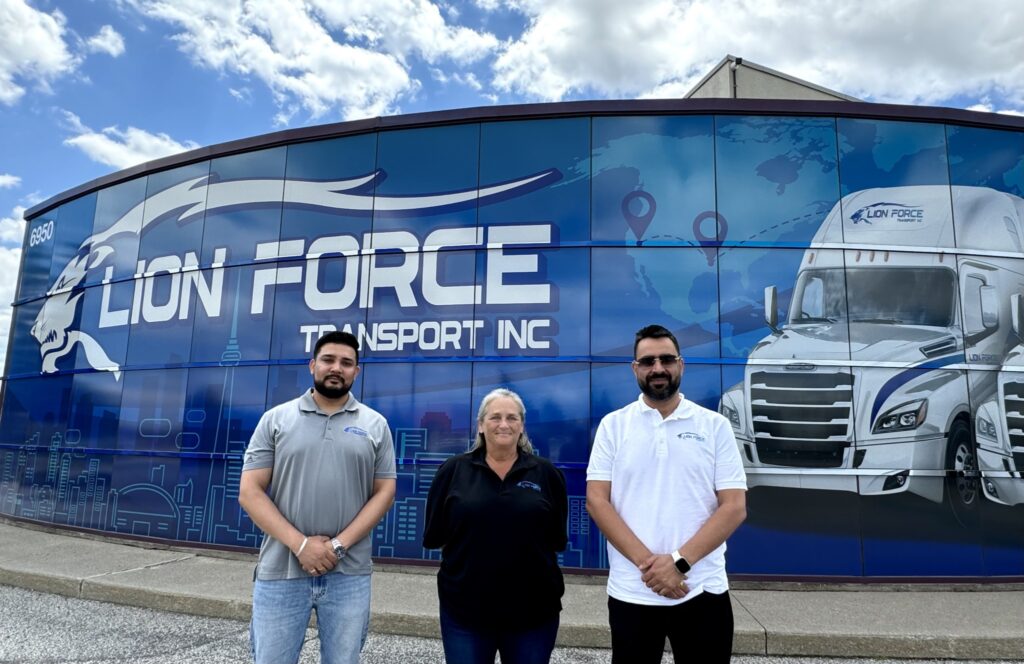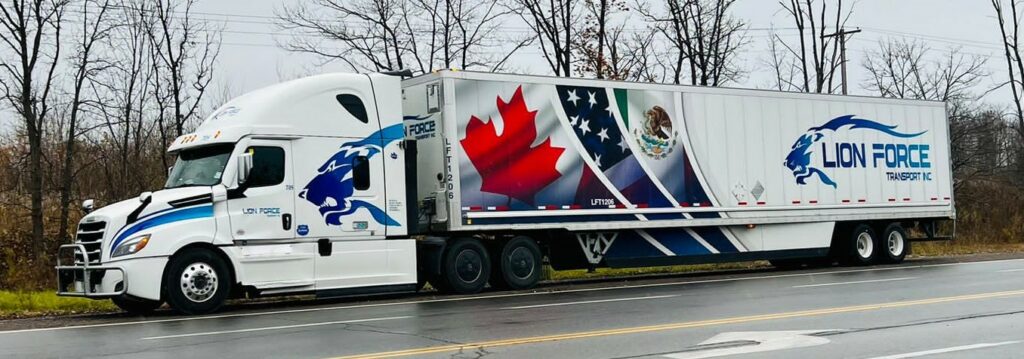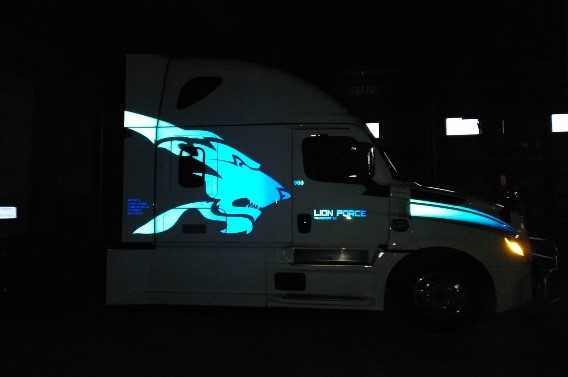Lion Force Transport’s safety investments drive growth and efficiency
Founded by three friends and former colleagues in 2016 with just three trucks, Lion Force Transport currently has a fleet of more than 150 trucks and employs nearly 300 drivers.
The company owners — Harry Hundal, Jay Kajla, and Maninder Nijjar — invest heavily in technology and equipment to bring all operations in-house, aiming to grow the company through improved efficiency, reduced maintenance costs, and on-time delivery of customers’ goods while cultivating trusting relationships.

Lisa Arseneau, who became a general manager for Lion Force in January this year, spent more than 30 years in the insurance industry, specializing in risk management. She says the fleet has been her client since its inception eight years ago, adding that dedication to safety, innovation, and continuous improvement were some of the factors that influenced her decision to join the company despite her plans to retire.
“We invest heavily in technology, providing customers with open visibility of loads through [investments like] cameras and AI-driven tools,” Hundal told TruckNews.com.
By installing AI-driven cameras throughout its yard, for example, Lion Force Transport has significantly reduced the need for security personnel. These cameras can monitor drivers, detect unauthorized vehicles, and provide visibility to customers.
Hundal added the tracking tools the company has invested in allow it to build relationships with clients by providing transparency regarding their loads, as customers can monitor the real-time location of their loads and trailers.
“Customers [don’t] want to sit on a computer, writing emails. They don’t want to pick up their phones. They just want to see what they want to see.”
Legal and safety benefits
The technologies, particularly cameras, have already paid off, helping the company to avoid a costly verdict in a lawsuit in the U.S.
“We just finished on a claim from two years ago,” Arseneau said. She explains the company was able to significantly reduce its liability in a court case due to clear evidence that disproved the plaintiff’s claim that the driver was incapacitated. The camera video showed the plaintiff getting out of their vehicle and coming around the company’s truck.
“So, what could have been a $2 million court case came down to under $150,000,” she said. “The third party was held accountable by a certain percentage.”
Some of the other technologies the company has invested in include a telematics platform that collects live vehicle location and performance data and also enables two-way messaging between drivers and dispatch for updates. It also spec’s radar and windshield-mounted cameras on new trucks that provide additional location and safety monitoring beyond the primary cameras.

“Cameras, and speed monitoring is huge. We have critical events that we monitor daily – those are videos that are sent to us through our platform – about hard braking, hard left turns, hard right turns, following too close, etc. Those things are monitored and addressed,” says Arseneau.
Lion Force is particularly excited about one of the devices.
“It’s a sensor; even if the driver is wearing sunglasses and he’s sleeping, it tells you right away if he’s blinking eyes more than he is supposed to,” Hundal explains. “So even if he’s wearing Polaroid glasses, it can detect his eyes.”
Arseneau added the sensor also recognizes if a driver gets drowsy and nods their head.
While some drivers in the industry have raised concerns over technologies like in-cab facing cameras, Hundal said Lion Force drivers are welcoming of such technologies as they recognize their value in safety.
The company has also recently switched to a new accounting and onboarding software. The latter digitally tracks driver qualifications and maintenance records, improving record-keeping. Any change in technology or software is complemented by staff training – with professionals from the third-party providers invited to come on site to teach the proper use of their technology.
Upcoming move
One of the most significant milestones includes moving into a new facility in August.
The new yard will have an automatic truck wash, scales, nitrogen tanks for tires, and on-site fueling to reduce city driving costs.
“The new terminal will have everything needed for transportation operations,” Hundal said, adding his facility will allow it to service the entire fleet in-house, eliminating the need for outside service providers and reducing operational delays.
“The biggest investment we’re doing right now is the alignment machine,” he added. “Whenever you change tires, whenever you do anything, the truck has to go through alignment. In the outside world, there are only a few places to do alignments, [so] you have to wait a couple of days. But if you have your own shop, as soon as your mechanics change the tires, you can align, and the trucks can be back on the road right away.”
Aggressive equipment replacement strategy
Lion Force says it also replaces its trucks every two to three years to reduce maintenance costs associated with outdated vehicles and provide a comfortable environment for its drivers.
Hundal adds that mechanics are also available on site around the clock, so that every truck and trailer coming in from a trip can be inspected and checked before being parked in the yard.
The safety practices have been paying dividends.
“It gets to a point where even in the U.S., they stop pulling us in [at the scales],” Arseneau said. “Roadside inspections are very few and far between because they know our equipment’s great, so they don’t waste the time.”
Hands-on management
The management team – including co-founders Hundal, Kajla, and Nijjar – said they are deeply involved in daily operations, often working six to seven days a week and being available around the clock. This constant involvement includes personally checking videos of special risk videos from cameras to coaching drivers directly.
Hundal adds that despite an industry-wide driver shortage, the company saw a steady flow of drivers in the past eight years, managing to keep its overall employee turnover low.
When asked about the things that matter most to drivers, Kajla and Hundal both talk about respect, as well as timely pay and well-maintained equipment.
Strengthening driver-dispatcher relationship
Kajla says that prior to starting Lion Force, he worked in the dispatch department for several years in other companies, observing truckers who’d get upset over a lack of respect from dispatch.
“I know the struggle between the dispatcher and the driver,” Kajla said, adding that even though the challenges can arise from both sides, the friction between drivers and dispatchers – regardless of who’s in the wrong – can affect not only the overall job satisfaction, but also safety.

“I told them [dispatchers], ‘Don’t compare your job and [the] driver’s job. The driver job is way harder than sitting here and giving him directions. I told them to deal with everything in a nice and calm way. Because if you push the driver on the road, he can get frustrated, and it can [result] in an accident.”
Instead, issues are addressed once the driver returns safely through a calm discussion of how to improve, rather than confrontations while driving.
To make sure everyone is treated fairly, Lion Force Transport also keeps a close eye on how work is assigned. “We have some owner-operators and company trucks, but we told the dispatch to split the work fairly, don’t give more work to company trucks and less to owner-operators. Just balance it out,” Kajla said.
Have your say
This is a moderated forum. Comments will no longer be published unless they are accompanied by a first and last name and a verifiable email address. (Today's Trucking will not publish or share the email address.) Profane language and content deemed to be libelous, racist, or threatening in nature will not be published under any circumstances.